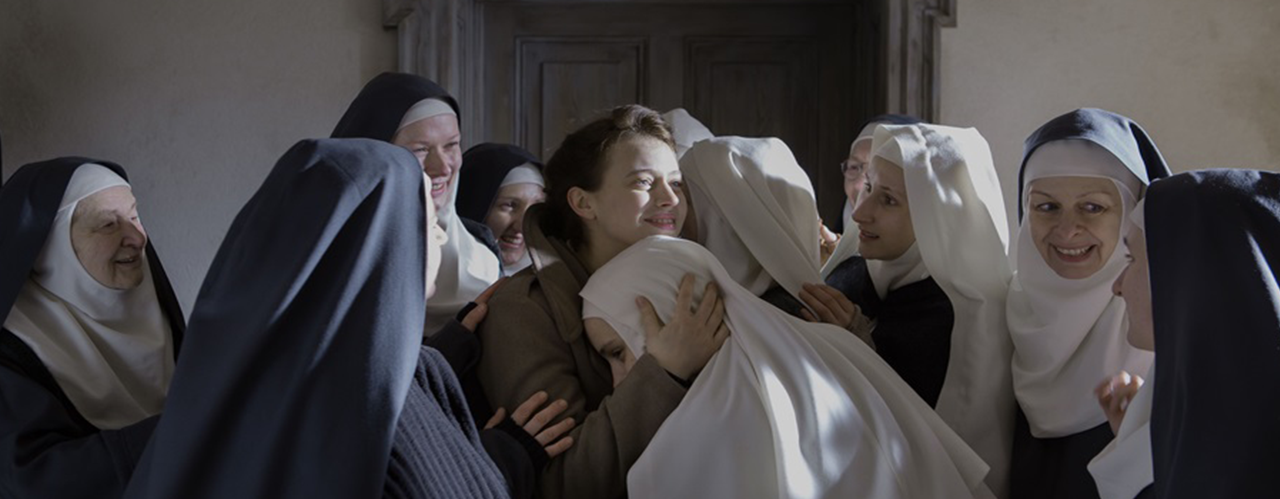Alissa Wilkinson | Agnus Dei tries to approach (but not fix) the repercussions of unspeakable cruelty with the quiet balm of beauty. A must-see film that quietly suggests a surprising answer to the problem of evil. (image by Anna Wloch)
One of the oldest refrains in the world is the theodicy question: how could a good God let bad things happen?
That question animates Agnus Dei, which premieres at the Sundance Film Festival on Tuesday. But the film's answer is expansive, complex, and subtly subversive. Directed by Anne Fontaine (Coco Before Chanel, Gemma Bovary) and led by an all-female cast, the movie tries to approach (but not fix) the repercussions of unspeakable cruelty with the quiet balm of beauty.
Agnus Dei is set in 1945, amid the ruins of World War II. Mathilde (Lou de Laâge) is a young French doctor working with the Red Cross in Poland. Through an unusual set of circumstances, she comes into contact with a convent of Polish nuns who, she discovers, are in advanced stages of pregnancy. Months earlier, a group of Russian soldiers had broken into the convent and raped the women repeatedly, staying for several days. The horror haunts them still, even while they have tried to regain their faith and practice their vocation. Full of shame, they’re convinced of the need to conceal their condition, lest they be shut down by their superiors. And yet the reminders linger in their own bodies and, nine months later, are about to arrive.
Mathilde isn't Catholic; over vodka one night, she tells her fellow doctor and sometime lover Samuel (who himself is Jewish) that her parents were staunch Communists, and she seems untroubled by her lack of faith. Late in the film, it becomes clear that Mathilde and Samuel, considered by some to be the unholy interlopers in a world of peace and piety, are in fact more aware of the implications of their own vocation as doctors than some of the women in the convent.
That in part is the genius of the film: it doesn't force Mathilde or Samuel to have some kind of religious awakening in order to act as an angel of mercy for the nuns, nor does it lump all the pregnant women into one category, with one way of thinking about their predicament. Those women are painted as full, complex characters in a few deft strokes—women who are struggling after rape to know whether they believe in something anymore, to understand their vows of chastity, to live in the problem of theodicy every day.
The word "beauty" gets tossed around irresponsibly a lot, often by people who feel the need to invoke it in art's defense. But that does beauty a disservice. It is not a quality that lets us feel the things we find pleasant are worthwhile; it is an unruly, unsafe force that we feel in our bones rather than our minds, and that makes us desire. (To say that beauty is erotic isn't to tie it to sex; it's to say it makes us want, in a non-rational way.)
So to say Agnus Dei is a stunningly beautiful film isn't to aestheticize it. Most of the film’s images could be paintings, images of women shot in the natural light and shadow of the convent, of stark forests laden with snow, backed by the sounds of the women singing their prayers and—finally—Max Richter’s “On the Nature of Daylight” (which I only recognized because it’s the melody that makes me most achingly sad, in all the world). But every bit of this comes at great price to the wounded and victimized.
But it is that beauty, evoked by the film's sensual elements rather than its narrative ones, that forms the film’s run at the theodicy question. Various characters try to give an answer for what has happened through appeals to beauty’s companions: truth and goodness. But those are insufficient on their own. Living a perfect life after tragedy cannot heal the tragedy; simply reiterating the truth isn’t enough to cover violence.
The characters never talk about beauty, living in the austerity of war-torn Poland on the one hand and the convent on the other. Instead, Fontaine allows the images and music to simply seep into the viewer’s bones, suggesting a third way of living with trauma. As one of the nuns points out to Mathilde, even when the war ends, the world is not going to be more kind to them. What saves them, ultimately, is a closer connection to the world outside their walls, to messier parts of life, to the beauty of the world in its woundedness.
In his dense book The Beauty of the Infinite: The Aesthetics of Christian Truth, David Bentley Hart writes about beauty and power:
Christ is a persuasion, a form evoking desire, and the whole force of the gospel depends upon the assumption that this persuasion is also peace: that the desire awakened by the shape of Christ and his church is one truly reborn as agape, rather than merely the way in which a lesser force succumbs to a greater, as an episode in the endless epic of power.
The film’s French title is Les innocentes, which is perhaps a better moniker. Many “innocent” people have been victimized by those with power—from the nuns and their offspring to the children who need someone to watch over them. Peace is what they yearn for: peace in which the lesser force, having surrendered to a greater one, is not hurt but made whole.
Agnus Dei doesn't give a definitive solution. It just points to a few starting places. And it makes us long for peace.
Alissa Wilkinson is Christianity Today's chief film critic and an assistant professor of English and humanities at The King's College in New York City. She tweets @alissamarie.
Check out the original article on Christianity Today site

